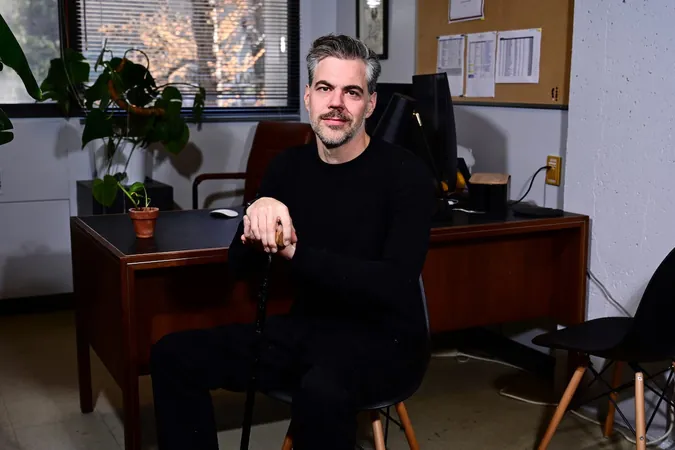
Rising Tide: Universities Grapple with Surge in Disability Accommodation Requests
2024-12-27
Author: Benjamin
Rising Tide: Universities Grapple with Surge in Disability Accommodation Requests
As universities across Canada face an upsurge in requests for disability accommodations, educators are increasingly challenged to navigate the complexities surrounding these demands. At Queen's University in Kingston, Ontario, Prof. Thomas Abrams noted that in his sociology class last year, nearly one-third of students were registered with the school's disabilities office, qualifying them for various academic aids, from extended deadlines to quieter exam settings.
This phenomenon is not isolated; more than 6,000 of Queen's 28,000 students (a staggering 22 percent) were granted accommodations last year, a steep rise from just 9 percent five years earlier. “The numbers are up,” Prof. Abrams, who advocates for better accommodation systems and personally identifies as disabled, observed, adding that the situation introduces complicated considerations relating to pedagogy, privacy, and mental health.
The national trend is alarming — the disability registration rate across Ontario universities leapt from 6 percent to about 12 percent, while McMaster University reported nearly tripling the number of students identified as having disabilities between 2013 and 2022. It is noteworthy that at the University of British Columbia, a substantial 26 percent of undergraduate students reported having a disability in a 2020 survey, with mental health disorders being the predominant concern.
The evolution in societal understanding of disabilities over the past decade contributes significantly to this spike in reported disabilities. Historically, reports indicated around 5 percent of university students disclosed disabilities between 1998 and 2008, but this figure soared to 31 percent by 2022, indicating a fundamental shift in attitudes towards mental health and learning challenges.
At Queen's alone, 75 percent of students receiving accommodations have non-physical disabilities. These include mental health issues, ADHD, and learning disabilities, suggesting that many challenges are hidden and not immediately recognizable. Sam Chamberland, a second-year economics student diagnosed with a working memory disorder, benefits from additional time on tests and reduced distractions during exams, a support he was initially familiar with in high school.
Recent reports have described a "tsunami" of accommodation requests at Queen's, revealing systemic challenges in addressing the rising needs of students. An independent review highlighted disparities in the accommodations process, prompting university officials to reassess their policies to better serve this growing population.
Despite this increase, some faculty members express concern regarding the fairness of accommodations, leading to a perception of potential abuse within the system. Finley Mackay, a first-year sociology student with ADHD and dyslexia, echoed sentiments of skepticism around the legitimacy of some accommodations, noting that not all who seek support may require it.
As universities hustle to comply with regulations mandating accommodations, they face increasing workforce strains. The Ontario Human Rights Code obligates institutions to provide necessary support, complicating dynamics as professors voice their frustrations regarding workloads and the impact on academic standards.
Experts like Jay Dolmage from the University of Waterloo emphasize that historically, universities have systematically excluded students with disabilities, and current support structures often inadequately address their varied needs. Reports reveal alarming ratios, with some disability office staff members stretched thin, managing upwards of 300 students each.
Queen’s has recognized these challenges, increasing the size of its Student Accessibility Services (QSAS) team and introducing new management software to streamline processes. Yet the pressure remains — funding for disability support has not kept pace with enrollment increases, leading to a worrying trend in resource allocation.
In response to this critical situation, the panel at Queen's University put forth 26 recommendations aimed at fostering a university culture that embraces inclusivity and understanding around disability accommodations. A key suggestion is to establish a senior academic leader focused on accommodations and form a dedicated committee of staff, faculty, and students, with half of its members identifying as disabled.
As universities grapple with these changes, the call for a more proactive and compassionate approach has never been clearer. Prof. Olmstead, president of the Queen's Faculty Association, expressed hope that the university will take the recommendations seriously, which could transform their approach to disability — propelling them into a future marked by greater understanding and support for all students.









 Brasil (PT)
Brasil (PT)
 Canada (EN)
Canada (EN)
 Chile (ES)
Chile (ES)
 España (ES)
España (ES)
 France (FR)
France (FR)
 Hong Kong (EN)
Hong Kong (EN)
 Italia (IT)
Italia (IT)
 日本 (JA)
日本 (JA)
 Magyarország (HU)
Magyarország (HU)
 Norge (NO)
Norge (NO)
 Polska (PL)
Polska (PL)
 Schweiz (DE)
Schweiz (DE)
 Singapore (EN)
Singapore (EN)
 Sverige (SV)
Sverige (SV)
 Suomi (FI)
Suomi (FI)
 Türkiye (TR)
Türkiye (TR)